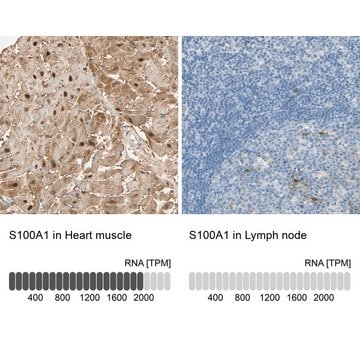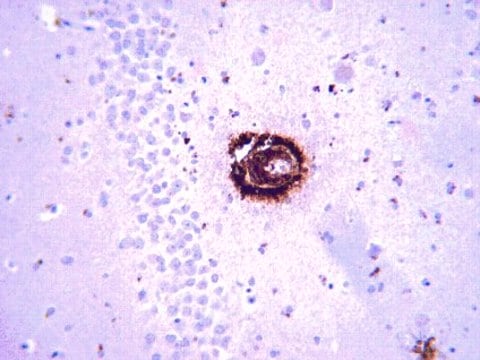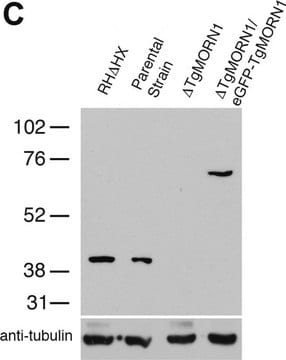MAB5740
Anti-Radial Glial Cell Marker-2 Antibody, clone RC2
clone RC2, from mouse
Zaloguj sięWyświetlanie cen organizacyjnych i kontraktowych
About This Item
Kod UNSPSC:
12352203
eCl@ss:
32160702
NACRES:
NA.41
Polecane produkty
pochodzenie biologiczne
mouse
Poziom jakości
forma przeciwciała
purified antibody
rodzaj przeciwciała
primary antibodies
klon
RC2, monoclonal
reaktywność gatunkowa
mouse
metody
immunohistochemistry: suitable
izotyp
IgMλ
Warunki transportu
wet ice
docelowa modyfikacja potranslacyjna
unmodified
Opis ogólny
The monoclonal antibody Radial Glial Cell Marker-2, clone RC2 (RC2) was generated in mouse by conventional hybridoma methodology. The antigen recognized by RC2 is robust, allowing aldehyde fixation appropriate to high resolution light and electron microscopic analyses. From the neural tube stage of fetal development the antibody delineates throughout the central nervous system a subpopulation of neuroepithelial cells which have a radial bipolar morphology. RC2 also recognizes monopolar cell forms in the spinal cord and the cerebellum as early as E15, and in the dentate gyrus of the hippocampal formation from the day of birth. Monopolar forms in the cerebellum are inferred to be progenitors of Bergmann glia. The robustness of the antigen recognized by RC2 makes this probe a valuable tool to study the morphological transformations of the bipolar radial glia during their mitotic turnover. It also provides a sensitive stain for the study of the organization and the histogenetic role of the overall radial fiber system (3).
Specyficzność
Detects radial glial cell marker-2
Other species have not been tested.
Immunogen
Embryonic rat brain
Zastosowanie
Anti-Radial Glial Cell Marker-2 Antibody, clone RC2 detects level of Radial Glial Cell Marker-2 & has been published & validated for use in IH.
Research Category
Neuroscience
Neuroscience
Research Sub Category
Neuronal & Glial Markers
Neuronal & Glial Markers
Postać fizyczna
Ammonium sulfate purified mouse monoclonal in PBS with 0.05% NaN3.
Format: Purified
Przechowywanie i stabilność
Stable for 1 year at 2-8°C from date of receipt. Handling Recommendations: Upon receipt, and prior to removing the cap, centrifuge the vial and gently mix the solution.
Inne uwagi
Concentration: Please refer to the Certificate of Analysis for the lot-specific concentration.
Oświadczenie o zrzeczeniu się odpowiedzialności
Unless otherwise stated in our catalog or other company documentation accompanying the product(s), our products are intended for research use only and are not to be used for any other purpose, which includes but is not limited to, unauthorized commercial uses, in vitro diagnostic uses, ex vivo or in vivo therapeutic uses or any type of consumption or application to humans or animals.
This page may contain text that has been machine translated.
Not finding the right product?
Try our Narzędzie selektora produktów.
Kod klasy składowania
12 - Non Combustible Liquids
Klasa zagrożenia wodnego (WGK)
WGK 2
Temperatura zapłonu (°F)
Not applicable
Temperatura zapłonu (°C)
Not applicable
Certyfikaty analizy (CoA)
Poszukaj Certyfikaty analizy (CoA), wpisując numer partii/serii produktów. Numery serii i partii można znaleźć na etykiecie produktu po słowach „seria” lub „partia”.
Masz już ten produkt?
Dokumenty związane z niedawno zakupionymi produktami zostały zamieszczone w Bibliotece dokumentów.
Hitomi Aoki et al.
Development (Cambridge, England), 139(4), 667-677 (2012-01-14)
Rest (RE1-silencing transcription factor, also called Nrsf) is involved in the maintenance of the undifferentiated state of neuronal stem/progenitor cells in vitro by preventing precocious expression of neuronal genes. However, the function of Rest during neurogenesis in vivo remains to
Expression and immunolocalization of Gpnmb, a glioma-associated glycoprotein, in normal and inflamed central nervous systems of adult rats.
Huang, JJ; Ma, WJ; Yokoyama, S
Brain and Behavior null
Lei Wang et al.
Nature neuroscience, 19(7), 888-896 (2016-05-24)
The unique mental abilities of humans are rooted in the immensely expanded and folded neocortex, which reflects the expansion of neural progenitors, especially basal progenitors including basal radial glia (bRGs) and intermediate progenitor cells (IPCs). We found that constitutively active
Loic Auderset et al.
PloS one, 11(6), e0155878-e0155878 (2016-06-10)
The low density lipoprotein-receptor related protein 1 (LRP1) is a large endocytic cell surface receptor that is known to interact with a variety of ligands, intracellular adaptor proteins and other cell surface receptors to regulate cellular behaviours ranging from proliferation
Jan Mulder et al.
The European journal of neuroscience, 31(12), 2166-2177 (2010-06-10)
The Ca(2+)-binding proteins (CBPs) calbindin D28k, calretinin and parvalbumin are phenotypic markers of functionally diverse subclasses of neurons in the adult brain. The developmental dynamics of CBP expression are precisely timed: calbindin and calretinin are present in prospective cortical interneurons
Nasz zespół naukowców ma doświadczenie we wszystkich obszarach badań, w tym w naukach przyrodniczych, materiałoznawstwie, syntezie chemicznej, chromatografii, analityce i wielu innych dziedzinach.
Skontaktuj się z zespołem ds. pomocy technicznej








